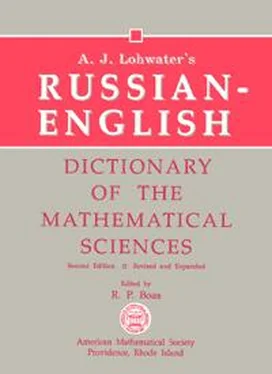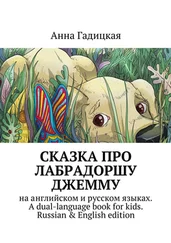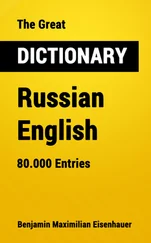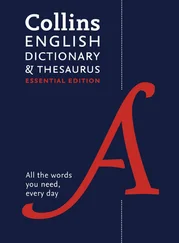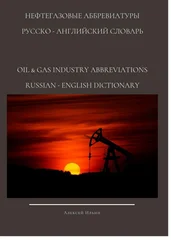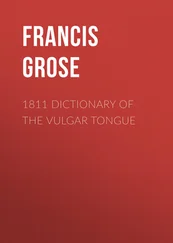Arthur Lohwater - A. J. Lohwater's Russian-English Dictionary of the Mathematical Sciences
Здесь есть возможность читать онлайн «Arthur Lohwater - A. J. Lohwater's Russian-English Dictionary of the Mathematical Sciences» весь текст электронной книги совершенно бесплатно (целиком полную версию без сокращений). В некоторых случаях можно слушать аудио, скачать через торрент в формате fb2 и присутствует краткое содержание. Жанр: Словари, Математика, Языкознание, на английском языке. Описание произведения, (предисловие) а так же отзывы посетителей доступны на портале библиотеки ЛибКат.
- Название:A. J. Lohwater's Russian-English Dictionary of the Mathematical Sciences
- Автор:
- Жанр:
- Год:неизвестен
- ISBN:нет данных
- Рейтинг книги:4 / 5. Голосов: 1
-
Избранное:Добавить в избранное
- Отзывы:
-
Ваша оценка:
- 80
- 1
- 2
- 3
- 4
- 5
A. J. Lohwater's Russian-English Dictionary of the Mathematical Sciences: краткое содержание, описание и аннотация
Предлагаем к чтению аннотацию, описание, краткое содержание или предисловие (зависит от того, что написал сам автор книги «A. J. Lohwater's Russian-English Dictionary of the Mathematical Sciences»). Если вы не нашли необходимую информацию о книге — напишите в комментариях, мы постараемся отыскать её.
A. J. Lohwater's Russian-English Dictionary of the Mathematical Sciences — читать онлайн бесплатно полную книгу (весь текст) целиком
Ниже представлен текст книги, разбитый по страницам. Система сохранения места последней прочитанной страницы, позволяет с удобством читать онлайн бесплатно книгу «A. J. Lohwater's Russian-English Dictionary of the Mathematical Sciences», без необходимости каждый раз заново искать на чём Вы остановились. Поставьте закладку, и сможете в любой момент перейти на страницу, на которой закончили чтение.
Интервал:
Закладка:
Студент знает. → The student knows.
b. Predicate nominative.
Они студенты. → They are students.
c. The nominative form is the one listed in the dictionaries.
2. Genitive case.A noun appears in the genitive case when expressing any of the following:
a. Possession.
работа профессора → the professor's work, the work of the professor
У профессора работа. → The professor has work.
b. "Of" clauses.
решение уравнения → the solution of the equation
c. Object of negation.
Число X не превосходит этой величины. → The number X does not exceed the magnitude.
d. Complement of certain verbs.
Мы достигнем результата. → We shall achieve the result.
e. Following numbers(except the number one and any compound with the number one):
i. Genitive singular following 2, 3, and 4, as well as any compounds in which the final component is 2, 3, or 4 (e.g., 22, 33, 54): три (3) книги, "three books"
ii. Genitive plural following 5 through 20, as well as any compounds in which the final component is 5, 6, etc.: пять (5) книг, "five books"
f. Following words denoting quantity.
Сколько теорем? → How many theorems?
много теорем → a lot of theorems
3. Dative case.A noun appears in the dative ease in the following environments:
a. Indirect object.
Студент читает доклад профессору. → The student gives (reads) a paper to the professor.
b. Impersonal expressions(sentences in which there is no grammatical subject):
Ивану легко читать по-русски. → It's easy for John to read Russian.
Студенту надо заниматься. → The student must study. It is necessary for the student to study.
4. Accusative case.A noun in the accusative case denotes the direct object: рассмотрим сумму, "let us consider the sum." In the accusative singular of masculine animate nouns, the accusative coincides in form with the genitive singular, while inanimate nouns exhibit the usual accusative endings: он читал доклад (inanimate masculine object доклад), "he read the paper"; он видел студента (animate masculine object студент), "he saw the student." Feminine nouns have only one form of the accusative in the singular. However, in the plural, all animate nouns, regardless of gender, have the form of the accusative which coincides with the genitive plural, while the accusative for inanimate nouns coincides with the nominative plural.
5. Instrumental case.A noun in the instrumental case denotes the following:
a. Means by which something is done.
выражать формулой → to express by a formula
Он пишет мелом. → He writes with chalk.
b. Agent in a passive construction.
Статья написана Иваном. → The article is written by John.
c. Manner of action.
говорить тихим голосом → to speak in a quiet voice
6. Locative case.A noun occurs in the locative case after the following prepositions:
в: в городе → in the city
на: на собрании → at the meeting
о: о проблеме → about the problem
In addition to the above uses, each preposition requires its object to be in a particular case. As described above under the Locative case, the three prepositions в, на, and оrequire the locative case. The preposition междуrequires the instrumental case, while the preposition околоrequires the genitive case. The preposition and its object, which may include one or more adjectives as well as the noun or pronoun, are adjacent to each other in a given sentence. See the table of prepositions below.
Also, certain verbs require their objects to be in a particular case. For instance, the verb называться(to be called, to be named) generally requires its object to be in the instrumental case. However, there has been a tendency for this verb to require the nominative case, as well.
7. Word order.Word order in Russian is flexible because each noun and its modifiers are in a particular case which expresses a specific meaning. In English, the word order subject-verb-object is the standard, while in Russian this order is not mandatory. Because the subject of a sentence is in the nominative case, the subject may appear at the end of the sentence; the reader can always identify the subject by its case. Similarly, the direct object is in the accusative case, while the indirect object appears in the dative case; these objects may appear anywhere in the sentence because the reader can always identify them by their cases. However, the word order subject-verb-object appears frequently. There are constraints, of course, in the ordering of components within a sentence. For instance, a preposition is not separated from its object, nor is a noun separated from its adjective in a noun phrase. Thus, noun phrases and prepositional phrases are generally placed as units within a sentence.
Mathematical symbols are of course not inflected, so that, strictly speaking, Russian cannot say "the number of edges of Q " but has to say число граней конуса Q ("the number of edges of the cone Q "). The extra word is not needed in English, and consequently a translation will read better if the extra конусаis omitted. However, some Russian authors now disregard the rule, apparently when "the syntax is clear from the context," and write число граней Q to mean "the number of edges of Q ," where the translator has to insert the "of" to prevent the reader from thinking that the edges are what is denoted by Q .
A further very common ambiguity arises when an author wants to describe an object and give it a name. For example, if we have a sequence of increasing continuous functions and want to name it S , we would be likely to write "a sequence S of increasing continuous functions." Russian prefers to put the descriptive phrase first: последовательность возрастающих непрерывных функций S .A reader who is not aware of this construction is quite likely to translate the phrase as "a sequence of increasing continuous functions S ," and give the impression that the functions are called S , whereas the author's intention was to call the sequence itself S .
| B. Nominative Endings of Nouns |
In general, masculine nouns end in a consonant with or without a soft sign, feminine nouns in the vowels -а, -я, and -ь, and neuter nouns in the vowels -о, -е. However, a more complete listing is given below. Note that the nouns presented here are in the nominative case, which is the case in which they are typically presented in the dictionary. The endings for each of the other cases are presented later.
1. Masculine nouns may end in a consonant, with or without a -ь, -й.
Читать дальшеИнтервал:
Закладка:
Похожие книги на «A. J. Lohwater's Russian-English Dictionary of the Mathematical Sciences»
Представляем Вашему вниманию похожие книги на «A. J. Lohwater's Russian-English Dictionary of the Mathematical Sciences» списком для выбора. Мы отобрали схожую по названию и смыслу литературу в надежде предоставить читателям больше вариантов отыскать новые, интересные, ещё непрочитанные произведения.
Обсуждение, отзывы о книге «A. J. Lohwater's Russian-English Dictionary of the Mathematical Sciences» и просто собственные мнения читателей. Оставьте ваши комментарии, напишите, что Вы думаете о произведении, его смысле или главных героях. Укажите что конкретно понравилось, а что нет, и почему Вы так считаете.
